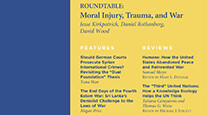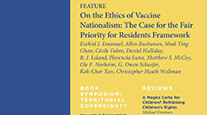In a recent global survey commissioned for the Millennium Summit of the United Nations, people around the world consistently mentioned good health as what they most desired. This preeminent concern with health is due no doubt both to the value that people attach to health in itself and to their recognition of its importance for pursuing their individual and collective projects.
While people agree on the value of health, policymakers, activists, and social theorists disagree sharply about the appropriate goals and optimal design of health systems. Sometimes disagreements are purely instrumental, relating only to the best means to achieve shared objectives. More often, however, they are a result of deeper differences concerning the role that a person's health plays in determining the quality of his or her life and the extent to which ill health and inequalities in health reflect injustices in social institutions.
Discussions of the relationship between justice and health have focused primarily on questions such as how health systems should be structured and financed and how public resources spent on health should be balanced against other social goals. But recent studies indicating close connections between socio-economic status and ill health have led many to recognize that the inability to achieve good health may result not only from lack of access to health care or other failures of domestic health systems, but also from inadequate social arrangements of different kinds and at many levels.
In spite of this substantial broadening of emphasis, exploration of the links between justice and health has continued to focus on problems that arise within societies, and there are important reasons for further extending these discussions from the societal to the global level. Societies interact within an increasingly rich framework of political and economic institutions that significantly affect the health prospects of all people. Hence, focusing solely on the justice of domestic health regimes may lead to a neglect of the ways that these institutions affect the capacities of societies to secure good health for their people. Moreover, health problems in one part of the world can lead to health problems elsewhere, and it will often be particularly difficult to manage them effectively and equitably without the coordinated response of many societies, among which burdens are fairly allocated. Finally, while there is room for reasonable disagreement among different societies that value health in different ways, and that allocate resources accordingly, there are limits to pluralism concerning global health regimes. If some countries operate a national health service while others embrace privatization, both may have their way. But such mutual accommodation fails when some countries push for strong protection of pharmaceutical patents worldwide while others pursue the right to grant compulsory licenses for essential medicines, or when some countries insist that international institutions be granted the resources and authority to set research and development agendas while others deny the legitimacy of these arrangements.
There is a need, then, to develop standards for assessing global rules and institutions that-though tolerant of different domestichealth regimes-express globally sharable values and priorities. In April 2002 the Carnegie Council's Justice and the World Economy Program sponsored a workshop on public health and international justice; its aim was to contribute to this task by engaging a range of scholars and health-policy specialists in the attempt to incorporate public-health concerns into a broader contemporary debate about global justice.
Our initial discussions centered on questions concerning the definition of appropriate international health goals. What information about health, for example, should be deemed relevant for assessing international policies, institutions, and rules? Should these be designed to promote life expectancy, the receipt of health-care resources, opportunities for good health, and access to health-care resources, or rather to secure the informed consent of patients and minimize the incidence of coercion within health systems? And what distributive considerations are relevant? Should we aim to establish some universal minimum health standard? Should we strive to achieve equal opportunity for health within or across societies? Or something else still?
Important as these issues undoubtedly are, it was clear that the primary source of many practically significant controversies concerning international health today revolve around the notion of responsibility-specifically, deciding how responsibility to provide relief for ill health should be parceled out.
In Volume 16, no. 2 of Ethics & International Affairs, a special section on health and global justice examines different aspects of the theme of responsibility for public health. Onora O'Neill suggests that preoccupation with medical ethics and health-care provision within developed countries has led many to misidentify relevant health standards and to overlook questions concerning the obligations of state and nonstate actors to address health problems in poorer parts of the world. Christian Barry and Kate Raworth argue that recent debates concerning access to HIV/AIDS drugs are rooted in disagreements about the appropriateness of different principles for assigning responsibility for health, and they indicate some of the difficulties in applying theories of responsibility to global problems. Daniel Wikler challenges the thesis that, because health depends on individual lifestyle choices, social and international responsibilities to restore health are quite limited. Thomas Pogge claims that we have especially stringent responsibilities to remedy health problems to which we contribute, regardless of whether those affected are compatriots or foreigners. Finally, Gopal Sreenivasan develops a policy proposal for an international tax that, he argues, will promote the health of poorer populations without placing unacceptable demands on anyone.
Most everyone agrees that there is something morally unacceptable about the fact that 34,000 children under the age of five die daily from hunger and preventable diseases, or that some 880 million people lack access to basic health services. The essays in this section suggest that fruitful work on the theme of "health equity" must complement and extend beyond ongoing technical discussions of appropriate international health goals and standards by engaging in detail with the difficult question of how responsibilities for the alleviation of global health problems should be allocated.

Ethics & International Affairs Volume 16.2 (Fall 2002): Special Section on Health and Global Justice: Health and Global Justice [Full Text]
Nov 25, 2002


